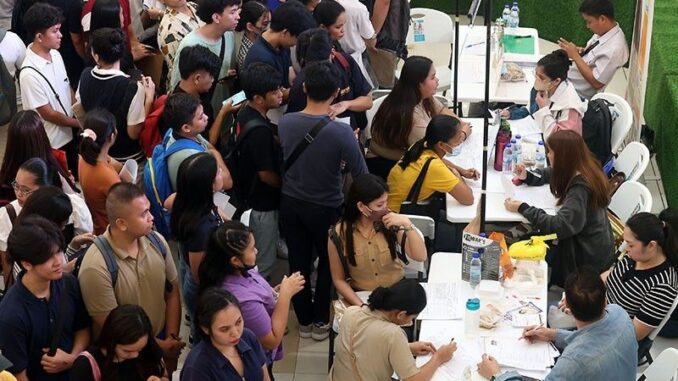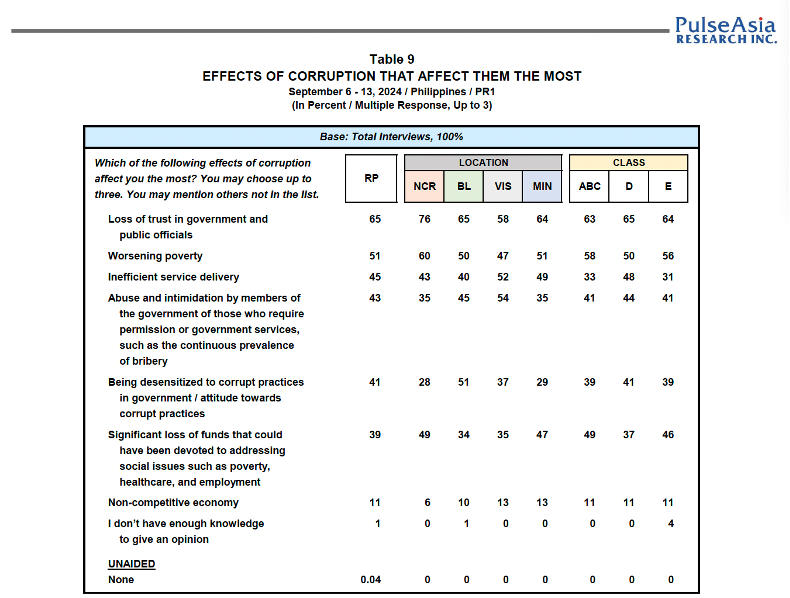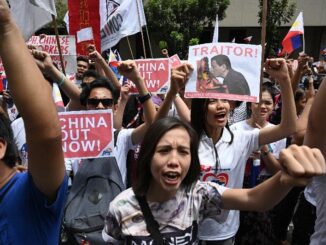
MANILA, Philippines — Most Filipinos prefer to look out for senatorial candidates who focus their campaigns on job creation and livelihood programs, investment-driven growth, and combating corruption, a survey found.
The Pulse Asia survey, commissioned by think tank Stratbase ADR Institute, asked 1,200 respondents to select three out of eleven options regarding what they consider the “most important issues” for senatorial candidates to address in their campaigns.
Overall, more than half of Filipinos (57%) hope for candidates to have “job creation, livelihood generation and financial literacy” as their platform. This result was consistent across regions.
Second to this was the campaign for “investment-led economic growth,” which 44% of respondents answered.
Fighting corruption was the third highest choice, with 41% of respondents looking for plans and efforts from those making their senatorial bid.
Other answers, while not garnering as much votes, include quality healthcare, education, peace and order, wider internet access or connectivity, renewable energy use, better mass transportation and the lowest being efforts addressing illegal drug use and trade.
Stratbase
The survey also included three additional questions regarding Filipinos’ perspective on corruption in the country.
As the 2025 midterm election draws near, discussions on ending corruption, abolishing forms of pork barrel in the government and investigating government officials’ alleged misuse of public funds are becoming more prevalent.
“Voters want to see a commitment to integrity and accountability from those who aim to serve, and a clear stance on anti-corruption is essential for building public trust,” Stratbase CEO Dindo Manhit said in a statement.
Corrupt officials must be held accountable
The first corruption-related question simply asked how strongly Filipinos believe government officials involved in corruption should be held accountable. Respondents could strongly agree, somewhat agree, disagree or indicate that they are undecided.
It found that 91% of Filipinos want government officials involved in corruption to be held accountable, while the remaining 9% had no opinion.
This also means that nine in 10 Filipinos believe that elected and appointed officials in public office should exercise financial transparency in how the country’s taxes and budget are spent.

Stratbase
Addressing corruption boosts trust, improves living conditions
Meanwhile, the second question explored how Filipinos perceive the benefits of anti-corruption measures in government. Respondents were given a list of options and asked to choose three.
About three in five Filipinos (61%) said that people will trust the government’s decisions and actions more if corruption is controlled.
A similar number (58%) of Filipinos also believe their standard of living will improve.
Ranking third in the list is the belief that the economy will grow, which one in two (52%) Filipinos answered as part of their three choices.
“Controlling corruption is not only about enforcing accountability; it translates to real benefits for our people. Transparency and accountability paves the way to responsive governance,” Manhit said.

Stratbase
These results were consistent across socioeconomic classes, but the same could not be said for different regions.
Among respondents in the National Capital Region 70% align with the top answer, while 71% in Balance Luzon (outside Metro Manila) believe that lives of ordinary citizens will improve.
In Visayas, the most common response was economic growth (69%), while in Mindanao, 55% of respondents felt that trust would increase.
Allowing corruption to persist desensitizes Filipinos
Similar to the previous question, respondents had to select three options from a list of potential answers regarding how government corruption affects Filipinos.
A great majority of Filipinos (65%) said it would decrease public trust, while 51% believe it would push more Filipinos into poverty due to the misuse of public funds.
Meanwhile, about two in five Filipinos (45%) view that corruption leads to inefficient public services, including slow implementation of government programs intended to benefit their welfare.
The fourth most common response, chosen by 43% of respondents, is the belief that government officials will abuse and intimidate Filipinos by demanding bribes in exchange for essential public services.
Not far behind, 41% of respondents think that unchecked corruption desensitizes the public.
When government corruption becomes widespread, Filipinos are less surprised when they learn of public officials being involved in malversation, embezzlement, bribery and other corrupt activities.

Stratbase
“This is why fighting corruption is not just a moral imperative, but a crucial step toward building a just, effective, and accountable government that truly serves the people,” Manhit said.
The Pulse Asia survey was conducted from September 6 to 13 and had a ±3 margin of error.





Be the first to comment